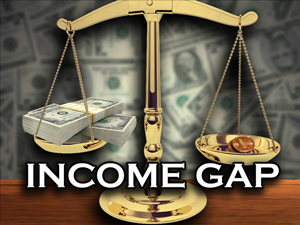By Saeed Shabazz-Staff Writer-

NEW YORK – Social scientists have become concerned with income and wealth inequality in the United States and are organizing “Equity Summit 2015: All in for inclusion, Justice, and Prosperity.” The two-day conference is scheduled for Los Angeles, California, Oct. 27-29.
“Join thousands of committed, dynamic, diverse, and passionate leaders determined to craft and fortify the next wave of strategies and actions to address just and fair inclusion,” declares the call for the summit on the equity2015.org website.
Concern about income inequality is spread across the country.
Activist and longtime radio talk show host Bob Law told The Final Call New York City is now the USA’s “capital of inequality,” and a proactive strategy is needed “given the fact that poor people are the un-organized.”
Mr. Law held a special “Night Talk Live” forum, which aired on WBAI radio, a Pacifica network station.
The forum was the first stage in preparing for what Mr. Law called an upcoming economic sanctions campaign.
“It is what Dr. Martin Luther King, Jr. in 1965 called ‘economic withdrawal,’ the only leverage we have for forcing the policy makers to make us a priority,” said Mr. Law.
Mr. Law argued income inequality starts with policy making by politicians who take their orders from corporations.
The Urban Policy Institute shared with The Final Call a report complete with charts on wealth/income inequality. “We need to put equity, racial and economic inclusion at the heart of our strategies for economic growth,” the report said.
“I think it brings up some interesting issues, like how student loans, retirement, and home ownership can contribute to wealth inequality,” said Laura Greenback of the Urban Policy Institute.
Caleb Quakenbush, an Urban Institute researcher, told The Final Call via e-mail that one important mechanism for ending economic inequalities is “retooling” tax policies in ways “that are better-targeted toward helping low-and middle-income families, including families of color, build wealth.”
The federal tax code contains roughly $400 billion in subsidies for homeownership, retirement savings, higher education, and small businesses, but research shows that the largest subsidies go mainly to high income families, Mr. Quakenbush noted.
“The federal government spent $384 billion to support asset development in 2013, but those subsidies primarily benefited higher-income families–exacerbating wealth inequality and racial wealth disparities,” the Urban Institute report stated. Income is money coming into a family, while wealth is a family’s assets such as savings, real estate and businesses.
Federal policies fail to promote asset building by lower-income families, said researchers and activists.
“The American Dream–just work hard and all of that–on the other hand maintaining the racial hierarchy. The position we are taking is that the policy makers don’t care about the poor and the elderly, because they cannot affect their political careers,” Mr. Law said.
This country has declared war on working class and the poor, and the government is moving to make it easier to keep people in poverty, he added.
A recent study by the Harvard Kennedy School’s Shorenstein Center on Media, Politics and Public Policy seemingly supports Mr. Law’s argument. The Center published a study, “Mayoral Policy Making: Results from the 21st Century Mayor’s Leadership Survey.” Topics discussed with 70 mayors included challenges facing their cities and policy priorities, as well as gentrification, income inequality and climate change.
When asked if cities should work to reduce income inequality, a majority of mayors said “no,” the survey found.
“Research suggests that U.S. cities’ importance is only going to grow in the coming years, and that three mega-cities–New York, Chicago and Los Angeles–are also becoming powerful political and societal players on the national and global stage,” the survey said.
We must be careful when politicians make blanket statements concerning public policy, said Dr. Raymond A. Winbush, director of the Institute for Urban Research at Morgan State University. “White folks are really bad on what they are going to do on social policy,” Dr. Winbush said.
Blacks and Latinos must form political coalitions to counter the right to center policy blocks supported by most Whites, he said. “What I am saying is that we need radical solutions for the radical problems that plague our community,” said Dr. Winbush.
“Our position is that Black lives do matter, that is why the first target of our ‘economic withdrawal movement’ will be the fast food restaurants that show a depraved disregard for Black life,” Mr. Law said. The strategy will be to boycott corporations and businesses that are part of the problem of promoting income inequality or sucking the economic lifeblood out of Black neighborhoods, according to Mr. Law.
“Google it,” he said. These companies choose locations based on race not income–therefore Blacks are being targeted, he said.












